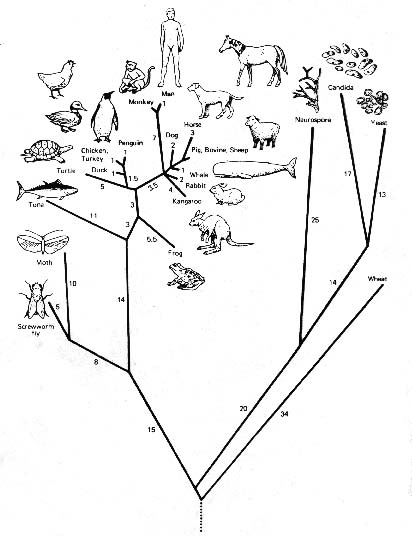For many Christians, evolution is a synonym for atheism.
The notion that life evolved slowly over millions of years through natural selection rather than spontaneously erupting from the hand of God has largely destabilized the traditional understanding of the natural order as presented in the creation myths of Genesis.
For a number of Christians, evolution kills any possibility of a magnificent Creator who formed the cosmos from the void, the Artist who paints the horizons with wondrous sunsets, the Potter who molds the human clay, the Author who writes the story of life on Earth.
Without an author, humans can no longer be sure that the story’s end will be happy. Without a painter, humans cannot behold the beauty of God within the natural world. Without a potter, humans are little more than off-center lumps of clay twirling awkwardly on the wheel of life. Without a Creator, humans can no longer be made in his image.
I should know, because I used to be one of those Christians. For years, I thought of Darwin as an agent of devilish misinformation who stood against God’s ultimate, infallible truth when it came to creation. To me, evolution was one of the great spiritual battles of modern times, and I was a foot soldier on the side of God fighting against an onslaught of evolutionary godlessness.
 For me at the time, a Christian who accepted the theory of evolution as a scientific truth wasn’t just as signal of a lack of faith or a capitulation to secular culture.
For me at the time, a Christian who accepted the theory of evolution as a scientific truth wasn’t just as signal of a lack of faith or a capitulation to secular culture.
Instead, it signaled the end – the death – of the Creator God.
But such a death also signals liberation.
So in honor of Darwin’s birthday and Evolution Weekend, I am giving thanks as a Christian like others in the Clergy Letter Project for the courageous brilliance of the man who pioneered the theory of evolution and for the invigorating liberation he has offered people of faith. As an Episcopalian, I am proud and honored that Darwin is buried in Westminster Abbey in London, thinking, in fact, that it is quite appropriate that his body lies there.
Indeed, once the defensive naivety of biblical literalism fades, I suspect that the Christian faith will look back in gratitude on the in-breaking of evolution into human consciousness as one of the most significant and fruitful theological events from the modern, scientific age.
Instead of one autonomous Creator dictating by divine right an absolute morality to which all human knees must bow, evolution offers us the ability to not just share and experience the world but to become creators of it ourselves. And this offer extends beyond humanity to the entire natural world. Indeed, through evolution, the whole earthly realm becomes collaborators with each other, creating together the world in which we live.
Evolution shows  us that species develop in response to the natural world, slowly and incrementally over time, and that one species’ evolution often impacts the evolution of other plants and animals within its ecosystem. Most, if not all, of this is random and selected naturally, but I can’t help but marvel at the evolutionary concert that plants, animals, reptiles, insects and humans have created up to this point.
us that species develop in response to the natural world, slowly and incrementally over time, and that one species’ evolution often impacts the evolution of other plants and animals within its ecosystem. Most, if not all, of this is random and selected naturally, but I can’t help but marvel at the evolutionary concert that plants, animals, reptiles, insects and humans have created up to this point.
Viewed theologically, this means that we are all creators, made in one another’s images, adapting to the adaptations of each other. As humans create on earth so to does the earth create on us. In our interconnected web of creating and being created, we come to be images of our planet and of all our co-creators on this terrestrial sphere. In this view, we can truly begin to see the deep wisdom of St. Francis of Assisi who called the moon, water, larks and crickets his sisters, the wind, fire, rabbits and wolves his brothers, and the whole Earth his mother.
Within evolution, everything and everyone has the potential be be a creator, as we live, breathe, interact, share and become Earth together. The wind, weather, environments, habits and our effects on them slowly change our planet, creating, over time, new heavens and new earths. All of us, from the microorganism to the elephant, become equals, subject to one another, in competition at times as much as collaboration.
 The question, then, that evolution presents Christians is not whether Darwin’s theory killed the Creator God. Rather, evolution asks us, “What kind of creators will we be?”
The question, then, that evolution presents Christians is not whether Darwin’s theory killed the Creator God. Rather, evolution asks us, “What kind of creators will we be?”
Perhaps this is the theological implication of evolution that most terrifies some Christians, the notion that we are all active creators rather than the passive creations. Because within this theological turn, we are simply human beings with the ability to create, like everything else. The difference for humans however is that, by and large, we should be responsible for what we create.
And so much of what Christianity has created of late has been dangerously toxic.
In the end, though, it will not be to some distant being to which we will have to answer for these creations. It will be to each other, to Sister Cricket, Brother Wolf and Mother Earth.
Connect with David on Facebook , follow him on Twitter or subscribe to his blog on the tab on the right.











